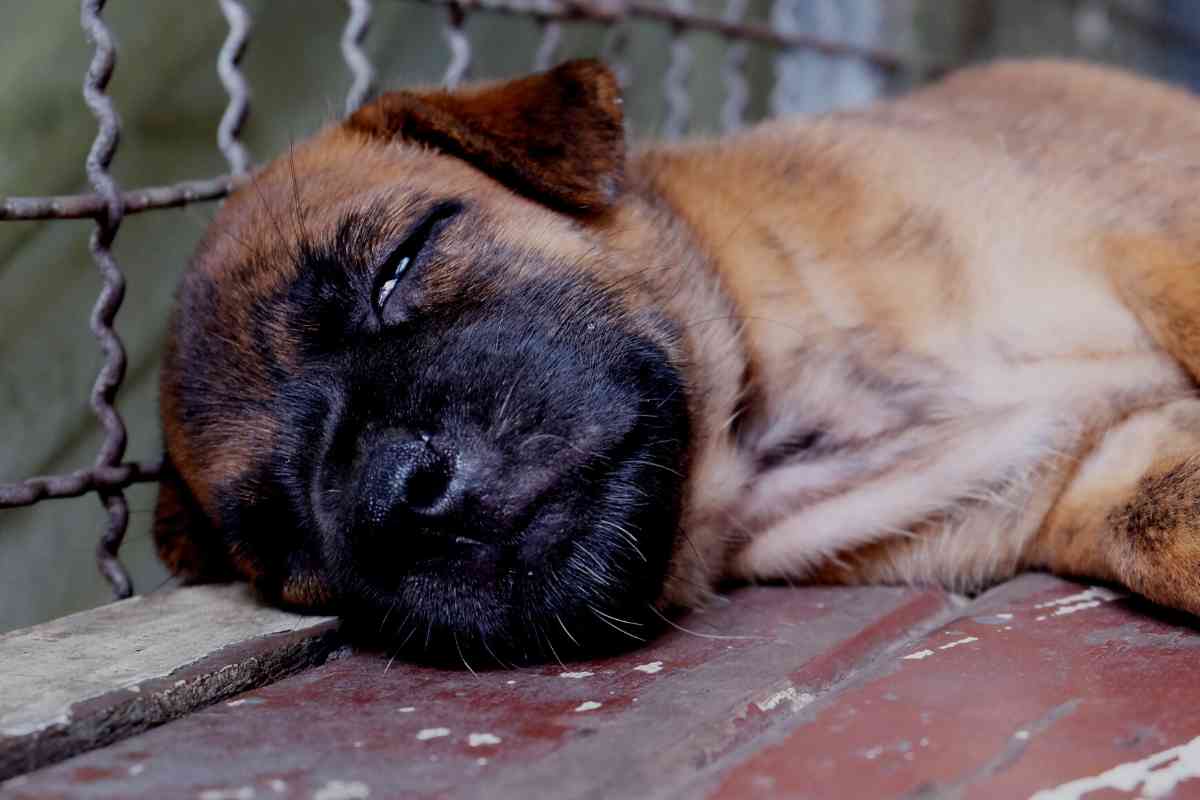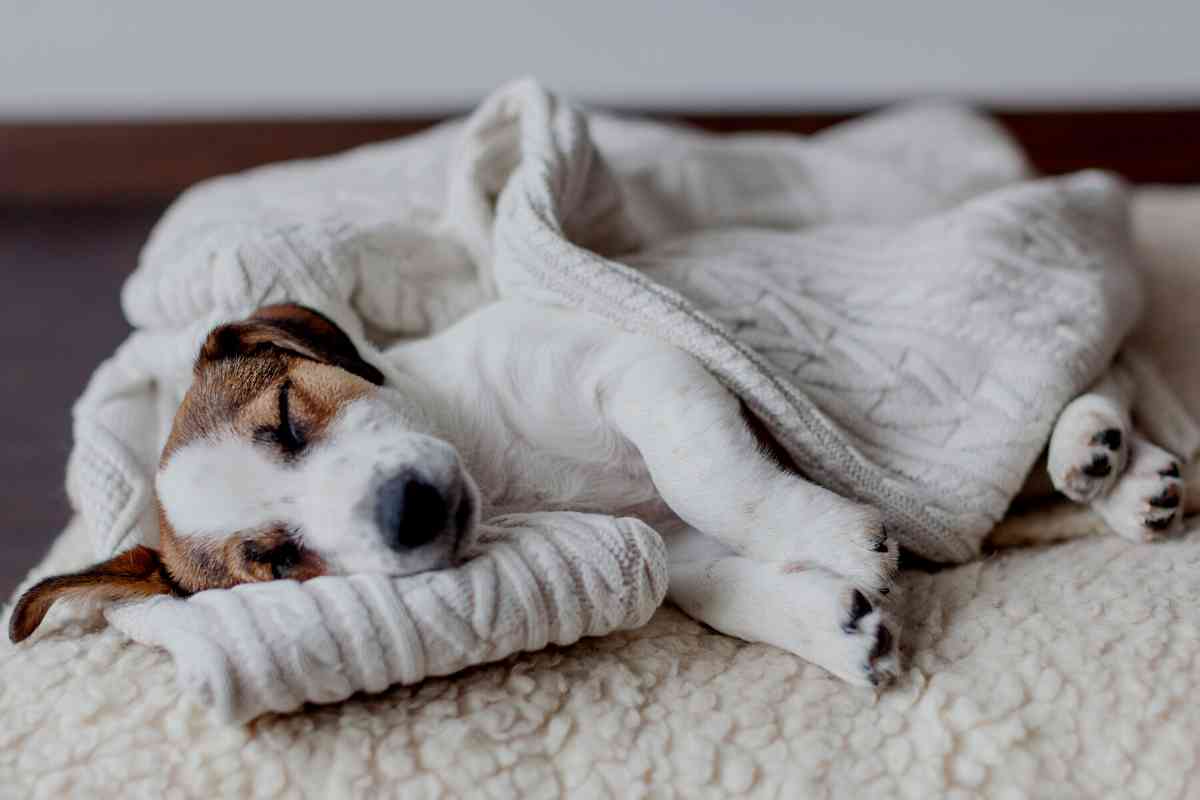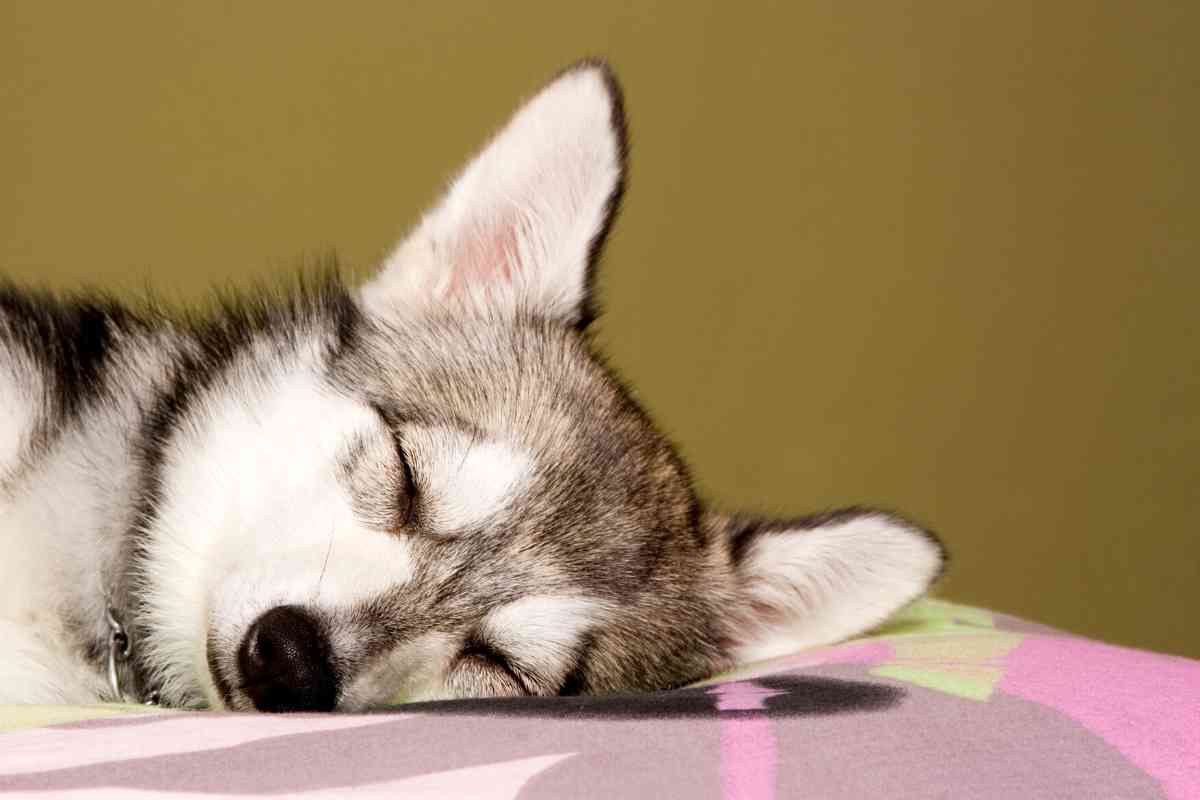Where Your Puppy Should Sleep On Their First Night & Other Useful Tips
Puppies are often nervous the first night at their owner’s home. They may have trouble sleeping. Where should my puppy sleep the first night?

Where Should a Puppy Sleep the First Night?
Usually, having the puppy sleep in a crate near your bed is the best idea. Try to comfort the dog as much as possible before you put it to bed. Put a thick blanket in the crate and make it as comfortable as possible.
I have had my dog since he was an 8-week-old puppy. While my puppy did feel scared and cry in their crate at first, it quickly learned that it was safe in its new home.
When you first bring a puppy home from the breeder, it will be scared. You need to help the dog learn to trust you. The dog feels unsafe in its new surroundings, and you need to show the dog that you will take care of and protect it.
If you teach your puppy to trust you right from the start, it will be easy to train the dog at any stage of its life. If you don’t do a good job at the start, your dog might learn everything slower later on.
Keep Your Dog Near You the First Night
Remember that your puppy might be downright scared the first night. It isn’t with the breeder, it isn’t with the mother, and it isn’t with its littermates. It doesn’t know you and doesn’t necessarily know that you want to protect and take care of the dog.
You might not want the dog to sleep in your bed, not even on the first few nights. However, you should keep your dog in the same room as you, even if you won’t be doing that for long.
Put the dog’s crate in your bedroom during the first few nights. Go to bed earlier than usual to make up for any

Try to Calm the Dog Down Before Bedtime
Some dogs are calmer on the first night than others. Your dog won’t always get scared, cry, and wake you up at night. Different dogs react differently.
Take the dog out for a walk once or twice first. Give the puppy a bit of puppy food and water. Possibly, the dog will be tired and sleep through the night without waking you up.
What I Did the First Night
What I did is keep my puppy in its crate but put the crate near my bed. The dog cried a lot and I comforted the puppy. However, it didn’t make a lot of noise after the first couple of nights.
I kept the dog in the bedroom for a couple of weeks before having the dog sleep elsewhere. The dog was ok its first night away from me because by then it trusted me and was used to its new surroundings.
Pick Your Dog Up On the Weekend
If you and anyone else are going to be away at work during the day, don’t get your dog during the work week. This will make the transition unnecessarily stressful for your puppy.
Your puppy should come home with you on Friday. That way, it can spend all of Saturday and Sunday with you before it has to be alone all day. If you can bring your dog home on a holiday, that is even better.
Giving your dog as much comfort as possible for the first few days is important. After a little while, the dog will at least realize that it is not in danger and that you will take care of it.
You can then start leaving the dog alone for a while and it will get used to it.

How Much Sleep Do Puppies Need?
Usually, puppies need a lot of sleep. However, they won’t necessarily sleep both in the afternoon/evening and at night. If it sleeps during the later part of the day, it may be up all night.
If you take your dog out and let it explore your house during the evening, that will discourage sleep during that time.
If the puppy is awake in the evening, it will probably sleep well at night and not need your attention.
Preparing Your Dog for Sleep
You can also help your puppy sleep through the night by intentionally tiring it out a bit first. The trick is to do an activity with your dog without over exciting it.
If you over excite your dog, it might be up for most of the night. However, a less exciting activity can have the opposite effect and make your puppy want to go to sleep and stay asleep.
How to Tire Your Puppy Out
Tire your puppy out during the day or during the evening, not right before bed. Don’t give your dog exercise half an hour before bed, because that will keep the dog awake.
If the dog has both an outdoor walk and some indoor play time during the day with their favorite toys, it may fall asleep easily.
A young puppy that is getting used to a new home needs routine and predictability. If you give your puppy the same bedtime routine every night, it will fall asleep easily.
Finish Everything an Hour Before Bed
Sometimes, finishing all activities an hour before bed is good enough. You can take your dog for a night walk, then play with and bond with your dog, and then put your dog to bed an hour early.
Get the point across that you want your puppy to go to bed. Dim the lights, and tell your dog to stay in place.
A new puppy will act like it doesn’t want to go to bed and needs more of your company. However, your dog may calm down shortly after the lights go down. The puppy will understand and accept that it is supposed to go to bed.

Using Music to Calm Puppies Before Bed
Some music certainly affects dogs, though a lot of it seems to have no effect. Dogs aren’t affected by music the same way humans are, but it does calm them down.
Music works when your dog is nervous or agitated for any reason.
Many dogs are scared by loud noises, such as fireworks or thunder, and you can calm them down with the right songs. Certainly, music can calm your dog down on its first night in your home.
Can Music Really Work for Dogs?
Yes, music is proven to affect dogs. Dog shelters use calming music, and research shows that this works.
Music reduces barking, makes dogs breathe more calmly, and even lowers stress hormones. Research also shows that music can be therapeutic for people with anxiety problems.
What Kind of Music Calms Dogs Down?
Reggae, soft rock, and classical music all work to help a nervous puppy sleep. Anything from Mozart to Bob Marley can be effective. Reggae is the best choice in my experience.
If you always play the same songs or the same genre of music to calm your dog, the music may lose its effect. If you change genres, you can frequently play music to calm your dog without ruining the music’s effectiveness.
There are many situations where playing calming music can help your dog:
- During the first night with a new owner
- When the dog is at home alone, especially if it is not used to that
- When your dog seems stressed out because it is spending a lot of time in its crate or other safe space
- When your dog is showing other signs of anxiety
- When your dog is scared of loud noises such as thunder
- When your dog is at the vet
- When your dog is in the car, especially if it is not used to travel
Anxiety Can Keep a Dog Awake
Like humans, dogs can suffer from anxiety. Your dog might pace back and forth, walk in a circle, or in some other way act restless. A stressful life event such as a move to a new home (or the loss of another pet or anything else serious) can make your dog nervous. Any of the following is a sign your puppy is anxious:
- Walking back and forth
- Shaking
- Looking around nervously
- Lip licking
- Panting
- Dilated pupils
- Drooling
How to Help an Anxious Dog Calm Down
Petting your dog can calm it down. Depending on your dog, it might like being petted gently on the face. Caressing it slowly and carefully down the face may make the dog stop feeling anxious.
You might also try rubbing your puppy’s cheeks in circles. Every dog is different. If your dog likes how you are petting it, it usually wags its tail and makes it obvious.
One thing my dog loved as a puppy and still loves is when I pet his ears. Circular motions around the ear often calmed my dog down during the first few nights at my home.
Dogs Need a Comfortable Sleeping Space
Your puppy will sleep better if it has somewhere comfortable to lie down.
Dogs often prefer to sleep on human beds, because they are above the ground. A dog’s instincts tell it that a raised bed is a good place because it can look around and see potential dangers from there.
However, you may not want a non-toilet-trained puppy sleeping on a human bed. Instead, you should get a thick blanket for the puppy’s crate and make it as cozy as possible. At this age, you should expect your puppy to have accidents in their crate.
Should a Puppy Sleep in a Crate the First Night?
Yes, having a puppy sleep in a crate the first night is a good idea. Get your dog used to some parts of your house (it doesn’t need to see every room) first. Teach the dog to like the crate by giving it food in the crate.
Ideally, the breeder should give you something that smells like the dog’s mother or the other pups when you take the dog away. This will comfort the dog. You might also give the puppy a stuffed animal or a hot water bottle.
What About Letting the Puppy Sleep in Your Bed?
If your puppy is having a really hard time, you might let it sleep in your bed. However, an eight-week-old puppy could easily wet your bed. You might use waterproof sheets, but keeping the puppy in its crate is a better idea.
Remember that your dog’s crate is supposed to be a low-stress place for the dog. The dog is supposed to go in its crate and lie down during the day if it feels stressed. Putting the puppy in the crate can calm it down and make it feel safe.
Put a Dog Bed in the Crate
Depending on how big the crate is, you might fit a dog bed inside it. Don’t use a dog bed if it will make the crate too cramped. Your dog needs to move around in the crate, so use a simple blanket if there is no room.
Physical Activity Helps Calm a Dog Down
Both humans and animals can sleep better if they get more physical activity during the day. Different breeds of dogs are different, and a dog that needs a lot of activity as an adult may not need much as a puppy.
Make sure the amount of physical activity is appropriate for the breed and the puppy’s age.
Feed Your Dog the Right Food at the Right Time
When you feed your dog matters. If you feed your dog too many calories right before bed, it may have too much energy to sleep.
You wouldn’t drink caffeine or feed a kid sugary candy right before bed and dogs are the same.
The quality of your dog’s diet can also affect how calm it is before bedtime. A lot of dog food is sugary or contains soluble carbohydrates. If you feed a puppy that before bed, it will have too much energy and won’t be able to get to sleep.
Key Takeaways
- You should have the dog sleep in your room for at least a few days, maybe a couple of weeks. The puppy will be downright scared at first. Give it some time to calm down before you have it sleep elsewhere.
- You can use physical activity to tire out your dog and make it fall asleep faster. However, don’t excite your dog too late, especially not in the last hour before bed. This will keep it awake.
- At first, your puppy won’t like having to go to bed. However, it will usually learn to accept that it should go to bed at a certain time.
- Feed your dog a good diet. The quality of its food matters a lot and affects its health and behavior. Natural dog food is much better than regular kibble, which is sugary and will keep your puppy awake.
- You can use music to calm an anxious dog own. You can also pet your dog to calm it. Your dog will sleep better if it has somewhere comfortable to sleep.